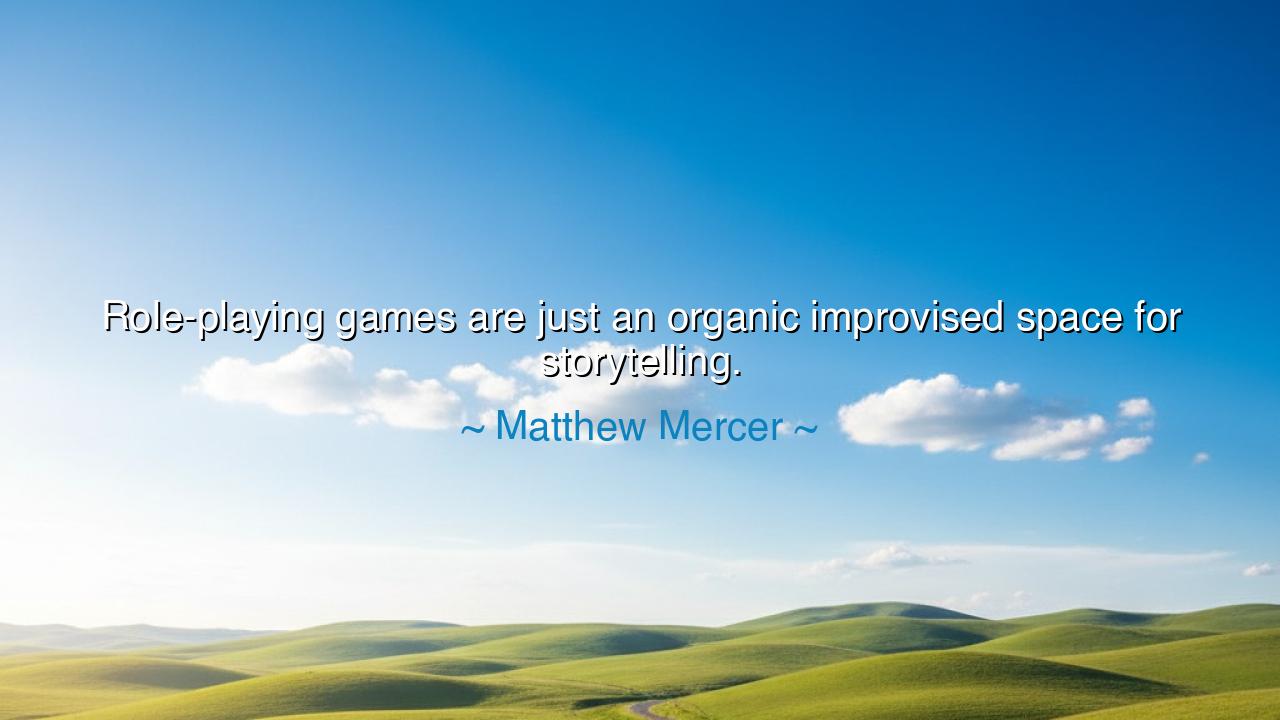
Role-playing games are just an organic improvised space for






Hear the words of Matthew Mercer, master of voices and weaver of tales: “Role-playing games are just an organic improvised space for storytelling.” Though spoken of a pastime, these words carry within them a truth as ancient as humanity itself. For long before the written word, before scroll or scripture, men and women gathered around firelight, weaving stories together—partly remembered, partly imagined, wholly alive. In Mercer’s declaration, we see the continuation of this eternal tradition, where imagination becomes the loom, and friendship the thread.
The meaning of this saying is that role-playing games are not merely games of dice or rules, but living stages upon which the heart and mind conspire to create. They are organic, because they grow without rigid plan, branching with each choice, each unexpected twist. They are improvised, because no script can bind them; the players breathe life into the tale as it unfolds, guided by freedom, chance, and creativity. Above all, they are spaces for storytelling—the most human of arts, where each voice contributes to a tapestry greater than itself.
The origin of Mercer’s insight lies in his own craft as a Dungeon Master, guiding groups of adventurers through lands of peril and wonder. He has witnessed how laughter, sorrow, and triumph emerge naturally from the shared act of play. In this he echoes the bards of old, who did not merely recite tales, but invited their listeners to step into them, to live them in the mind’s eye. The role-playing game is but a modern fire circle, where myths are born in the hearts of common people.
History gives us reflections of this truth. Consider the ancient epics: the Odyssey, the Mahabharata, the tales of the Norse skalds. These were not written down at first, but spoken aloud, adapted, reshaped each time for the audience. Each telling was organic, each detail improvised, and yet from these gatherings emerged some of the greatest works of human thought. What Mercer observes in his world of dice and imagination is but the rebirth of this ancient way—the communal making of legend.
Think also of the Commedia dell’arte of Renaissance Italy, where actors performed without fixed script, guided only by character, situation, and the sparks of their wit. The audiences laughed, wept, and saw themselves reflected in these improvisations. So too with role-playing games: they are improvisation with purpose, a theater where all are both actor and audience, where the barrier between stage and seat dissolves, and all partake in the act of creation.
The lesson is profound: every human soul is a storyteller. We need not wait for grand publishers or gilded halls; the power of story belongs to all. In every circle of friends, in every gathering of kindred spirits, lies the potential to create worlds, to give voice to heroes and villains, to confront fears and taste triumphs. To dismiss role-playing games as trivial is to forget that myth itself was born of such play, such shared imagination.
Practical action flows easily from this truth. Gather with companions not merely to consume stories, but to create them. Dare to improvise, to imagine aloud, to weave a narrative together with laughter and courage. Whether in a game, in a conversation, or in the daily choices of life, see yourself as both player and storyteller. For the stories you shape with others will bind you closer, will reveal to you truths you did not know, and will endure long after the dice are silent.
Take this as a guiding flame: “Role-playing games are just an organic improvised space for storytelling.” But in truth, life itself is such a game. Each day is improvised, each moment organic, and the story we tell together is the story of humanity. Therefore, play with courage, tell with honesty, and remember: the greatest tales are not read, but lived.






AAdministratorAdministrator
Welcome, honored guests. Please leave a comment, we will respond soon